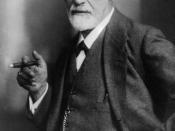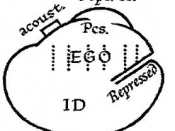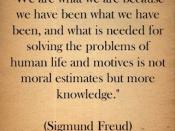In 'Boys and girls: The development of gender roles,' Beale gives us
revealing overview of Freud's personality theory. Beale point out both
strengths and weaknesses of his answer to the questions of 'Why' and 'How'
in gender development, but still leaves a chance for a reader to make up
her/his own mind about whether or not to accept Freud's theory. It is
relatively easy, however, to find oneself torn between openheartedly going
along with Freud's idea about the existence of a dynamic system (or libido)
in us, and reacting against the ease and assurance with which Freud writes
about castration fear in boys and penis envy in girls.
Freud's view of personality as a dynamic system of psychological
energy is a very complex, yet insightful approach to the development of
personality. The nature of the id, ego, and superego, and the psychosexual
stages that these three structures focus on during a course of one's
development, give a plethora of reasons to believe in the existence of a
critical period in gender development.
Freud's theory suggests that the way
in which the id, ego, and superego evolve and the way in which they
proliferate in the first six years of a child's life will influence the
child's emotional attachment to her/his parent of the same sex and, as
consequence, the child's gender identification.
I would agree with Freud's statement that children undergo a certain
emotional crisis after becoming aware of their genitals. It must be somewhat
frustrating for, e.g., a three year-old to realize that reaching a
pleasurable emotional state does not necessarily have to originate from
her/his mother. Unable to cognitively create an explanation to a new,
unexpected flow of circumstances and feelings, the child is most likely to
end up confused. This confusion will inevitably provoke anxiety, and...


